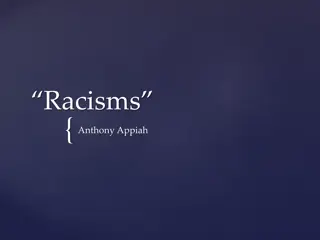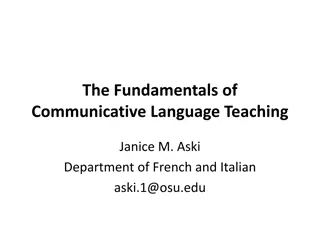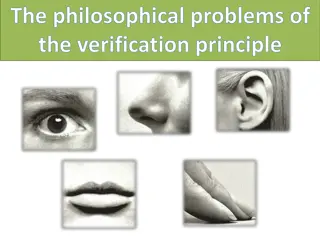Understanding Religious Language: Cognitivism vs. Non-Cognitivism in the University Debate
This discussion explores the debate between cognitivism and non-cognitivism in religious language. Cognitivism asserts that religious claims aim to describe the world and can be true or false, while non-cognitivism argues that such claims express attitudes and cannot be verified. Flew's challenge qu
0 views • 9 slides
New FDA Guidance on Early Alzheimer's Disease - Janice Hitchcock, Ph.D.
Janice Hitchcock, Ph.D., discussed the new FDA guidance on early Alzheimer's disease in a webinar. The guidance highlights key sections such as introduction, background, and diagnostic criteria. It emphasizes the importance of early intervention, appropriate outcome measures, and diagnostic criteria
0 views • 13 slides
Reflections on Life and Nature: A Study of Longfellow's Poems
Exploring themes of life, nature, and mortality in Henry Wadsworth Longfellow's works "The Tide Rises, The Tide Falls" and "A Psalm of Life." The poems delve into the inevitability of death, the enduring power of nature, and the meaningfulness of life's purpose. Through vivid imagery and poetic devi
0 views • 21 slides
Understanding Race: Appiah's Perspective on Racialism
Delve into Anthony Appiah's exploration of racialism, where he challenges the notion of races and racial essence. Through his arguments, he sheds light on the concept of racial inequality, institutional racism, and the complexities of defining race. Appiah's stance on racialism being false opens up
1 views • 14 slides
Understanding Religious Language: Flew, Hare, Mitchell
Exploring the contrasting views of cognitivism and non-cognitivism in the context of religious language through the perspectives of Flew, Hare, and Mitchell. Delve into Flew's challenge on the undetectable gardener, Hare's concept of bliks, and Mitchell's response to the rationality of religious bel
0 views • 7 slides
Exploring Communicative Language Teaching Fundamentals
Communicative Language Teaching focuses on real-life situations to facilitate meaningful communication. This approach aims to teach language through practical interactions, with a particular lesson goal being to learn how to greet, introduce oneself, and ask about others' names and origins. It empha
0 views • 23 slides
Understanding Discourse Analysis: Cohesion, Coherence, and More
Discourse analysis delves into written and spoken communications across various contexts. It encompasses cohesion, which includes grammatical and lexical links within text for creating meaning, and coherence, which ensures semantic meaningfulness. Explore how DA identifies and analyzes language use
1 views • 29 slides
Understanding the Philosophical Problems of Religious Language
Explore the challenges and debates surrounding religious language, specifically focusing on the verification principle, cognitive vs. non-cognitive aspects, and the meaningfulness of statements about God. Delve into the perspectives of religious believers and Logical Positivists, along with the infl
0 views • 18 slides







